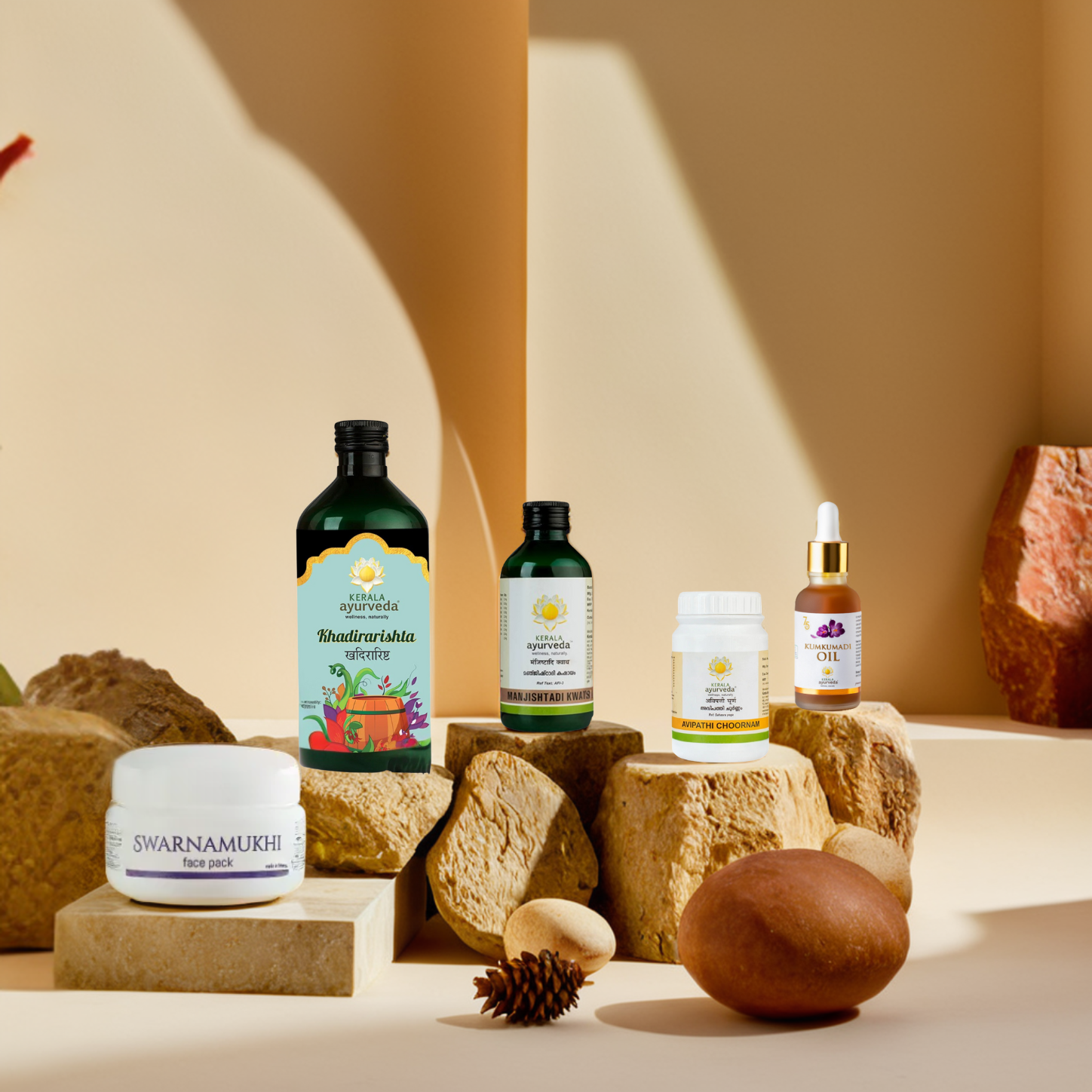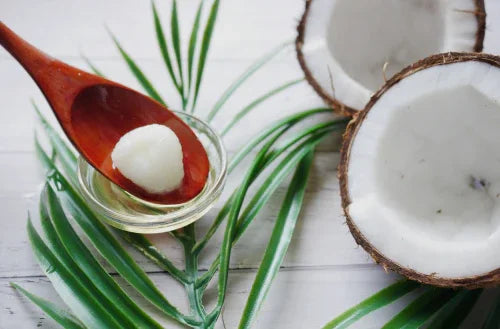Highlights
Flakes on your shoulders, constant itchiness, and the embarrassment of scratching in public—does this sound all too familiar?
For many, dandruff isn’t just a cosmetic issue; it’s a persistent problem that affects self-confidence. Ayurveda, with its 5,000-year-old legacy, offers a holistic approach to managing scalp health by balancing the doshas (Vata, Pitta, Kapha). This ancient system recognizes coconut oil as a natural remedy to address common scalp concerns, including dandruff.
Modern studies also support pure coconut oil’s efficacy, not just in reducing dandruff but also in improving overall scalp health. For instance, 60% of female respondents in a study reported no hair loss symptoms after consistent use of coconut oil over time. These findings highlight its potential as a nourishing, multifaceted solution for scalp and hair care.
Curious about how coconut oil can transform your scalp health and restore your confidence? Let’s explore its benefits and uses in detail.
Understanding Dandruff and Its Causes
“Dandruff is a common scalp condition characterized by flaking and itchiness. It typically occurs due to excess oil production, which creates an ideal environment for the Malassezia fungus to thrive. This yeast-like fungus feeds on scalp oils, breaking them down into oleic acid—a substance that can irritate sensitive scalps and trigger flaking.
People with Oily skin and who have conditions such as Seborrheic Dermatitis further contribute to dandruff. This chronic inflammatory condition causes redness, scaling, and stubborn flakes. Factors like dry skin, overuse of harsh hair products, and poor scalp health may also play a role.
Benefits of Coconut Oil for Dandruff
Coconut oil isn’t just a traditional remedy passed down through generations; it’s also supported by modern research for its exceptional scalp-care benefits. Beyond its reputation for hydration and soothing properties, coconut oil directly addresses multiple underlying causes of dandruff. Let’s explore its key benefits:
1 Locks in Moisture
Dryness often triggers dandruff, leading to an itchy, flaky scalp. Coconut oil helps the scalp retain moisture by creating a protective barrier, reducing dryness-related flaking and irritation.
2 Combats Fungal Overgrowth
Lauric acid, a key component of coconut oil, has potent antimicrobial properties that target Malassezia, the yeast linked to dandruff. By controlling fungal growth, it tackles the root cause and reduces flakes.
3 Soothes Irritated Scalp
Coconut oil’s anti-inflammatory properties calm redness and sensitivity, promoting overall scalp comfort and breaking the cycle of irritation and dandruff.
4 Strengthens Hair
Coconut oil nourishes hair follicles, reduces breakage, and prevents protein loss from hair strands, resulting in shinier, stronger, and healthier hair.
This combination of benefits solidifies coconut oil’s place as a trusted remedy in traditional and modern hair care. For severe or persistent dandruff, consulting a professional ensures optimal results. If you’re looking for professional guidance, Kerala Ayurveda’s doctors are available to help with personalized advice and holistic care.
How to Use Coconut Oil for Dandruff?
Wondering how to make the most of coconut oil in your dandruff-fighting routine? Incorporating it effectively can enhance its benefits for your scalp and hair. Here are practical and easy-to-follow methods to maximize its potential:
1 Try a Hair Mask
A coconut oil hair mask is one of the simplest ways to target dandruff.
- Gently warm 1–2 tablespoons of coconut oil until it melts. Ensure it’s not too hot to avoid scalp burns.
- Massage the oil directly into your scalp using circular motions to boost blood circulation and allow deeper penetration. Using a pure, high-quality coconut oil like Virgin Coconut Oil known for its antibacterial and antifungal properties, can further enhance results. Its natural composition helps fight scalp infections, including dandruff while improving blood circulation to the region.
- Leave the mask on for 20–30 minutes or even overnight for intense hydration. Cover your hair with a shower cap or towel to prevent mess.
- Wash thoroughly with a mild, sulfate-free shampoo to remove residue while leaving your scalp nourished.
If you are looking for a comprehensive approach, consider Kerala Ayurveda’s professional hair care sessions.
These Ayurvedic treatments combine personalized hair treatments and therapeutic hair oils for enhanced scalp health.
2. Enhance with Natural Ingredients
Supercharge coconut oil by combining it with other scalp-friendly ingredients to amplify its effects:
- Lemon Juice:
Mix a few drops of freshly squeezed lemon juice with coconut oil. The natural acidity of lemon juice balances the scalp's pH, boosting the oil’s antifungal properties.
- Honey:
Blend coconut oil with a teaspoon of honey for extra hydration. Honey locks in moisture and soothes irritated scalps.
- Tea Tree Oil:
Add 2–3 drops of tea tree oil to coconut oil. Tea tree oil enhances antimicrobial action, targeting Malassezia more effectively.
Alternatively, you can explore multi-ingredient Ayurvedic oils like Neelibringadi Keram, infused with coconut oil and potent herbs such as Neeli, Bringaraj, and Amla. This all-in-one hair treatment addresses dandruff, hair fall, and scalp irritation while nourishing your hair from root to tip.
3. Incorporate Coconut Oil into Your Shampoo
For a quick and convenient method, mix a small amount of coconut oil into your regular shampoo before washing your hair. This creates a hydrating cleansing routine that won’t disrupt your scalp’s natural balance.
4. Use as an Overnight Treatment
For persistent dandruff, apply coconut oil as an overnight scalp treatment. Massage it into your scalp, cover it with a shower cap, and rinse thoroughly the next morning. This allows the oil to work longer, offering deeper hydration and enhanced antifungal benefits.
5. Stay Consistent
Consistency is crucial for achieving and maintaining results. Use coconut oil 1–2 times per week, depending on your scalp’s needs. Regular application helps maintain a healthy scalp, reduce dandruff, and prevent recurrence.
Taking these steps ensures that coconut oil becomes a powerful ally in your fight against dandruff.
How Effective Is Coconut Oil in Treating Dandruff?
Coconut oil isn’t just a traditional remedy passed down through generations; it’s also backed by modern science. Research highlights its unique ability to hydrate the scalp and reduce inflammation more effectively than many other oils. Its multifaceted properties make it a standout choice for addressing dandruff. Here’s how coconut oil tackles the root causes of dandruff:
1. Targets Fungal Imbalances
Dandruff is often linked to an overgrowth of Malassezia, a naturally occurring scalp fungus. Earlier in this blog, we discussed how coconut oil’s lauric acid—a potent antimicrobial agent—effectively curbs fungal activity and restores balance to the scalp microbiome. By keeping fungal overgrowth in check, coconut oil minimizes flakes, irritation, and itchiness, making it a reliable option for fungal-related dandruff.
2. Calms Scalp Irritations
For those experiencing redness, itching, or inflammation, coconut oil’s anti-inflammatory properties offer quick relief. It soothes sensitive scalps affected by conditions like psoriasis or eczema, which can mimic or exacerbate dandruff.
3. Nourishes and Repairs the Scalp
Coconut oil provides essential nutrients, including vitamin E and fatty acids, that hydrate and strengthen the scalp. This creates an optimal environment for long-term scalp health, reducing future dandruff outbreaks.
4. Combats Oxidative Damage
Exposure to free radicals and environmental pollutants weakens the scalp’s defenses. Coconut oil’s antioxidant properties counter oxidative stress, preventing further damage and promoting a resilient scalp.
5. Enhances Hair Health
By preventing protein loss and deeply nourishing hair follicles, coconut oil strengthens hair strands while addressing dandruff. Its dual-action benefits—scalp health and hair strength—make it a holistic solution for overall hair care.
6. Gentle, Natural Care
Unlike chemical-based shampoos that can strip away natural oils, coconut oil offers a non-toxic, soothing alternative. It protects the scalp’s natural barrier while effectively addressing dandruff, making it ideal for sensitive scalps or those avoiding harsh treatments.
While coconut oil is effective for many, results may vary depending on factors like scalp sensitivity and the severity of dandruff. Persistent cases may require professional guidance.
For a holistic approach to scalp care, explore Kerala Ayurveda’s heritage expertise. With 80 years of Ayurvedic legacy, they offer tailored advice and high-quality, traditional products like Virgin Coconut Oil, ensuring safe and effective solutions for your scalp health.
Related read: Ultimate Guide to Ayurvedic Hair Care for Monsoon Season
Safety and Side Effects
While coconut oil is generally safe, it’s important to take a few precautions:
1. Perform a Patch Test:
Before applying coconut oil to your scalp, test a small amount on your forearm. This helps ensure you won’t experience an allergic reaction.
2. Watch for Reactions:
In some cases, individuals with conditions like seborrheic dermatitis might find that coconut oil worsens flaking or oiliness. If irritation occurs, discontinue use immediately.
3. Moderation is Key:
Overusing coconut oil can lead to product buildup on the scalp, potentially clogging hair follicles and causing issues like dull hair or scalp irritation. It’s best to use coconut oil in controlled amounts, washing it off thoroughly to maintain scalp health.
4. Seek Professional Advice:
If dandruff persists or worsens, consulting a dermatologist can provide clarity. They can help identify underlying issues and recommend appropriate treatments.
Conclusion
Dandruff can be a persistent issue, but coconut oil offers a simple, natural, and effective way to address it. With its hydrating, antimicrobial, and soothing properties, coconut oil tackles the root causes of dandruff, promoting a healthier scalp and hair. From hair masks to enhanced treatments with natural ingredients, incorporating coconut oil into your routine can make a significant difference. However, individual results may vary, and it’s essential to stay consistent and mindful of your scalp’s unique needs.
For those seeking authentic Ayurvedic solutions, Kerala Ayurveda’s 80 years of expertise ensures that their products, such as Virgin Coconut Oil and Neelibringadi Keram, deliver unmatched quality and effectiveness. Ready to explore the benefits of coconut oil and Ayurveda? Visit Kerala Ayurveda today to find the perfect product for your hair care needs and begin your journey to a flake-free, healthy scalp.
FAQs
1. Can coconut oil be used on colour-treated hair?
Yes, coconut oil is safe for colour-treated hair. Its moisturising properties help combat dryness caused by chemical treatments, but ensure you use a sulfate-free shampoo to retain colour.
2. How long should I leave coconut oil on my scalp?
For best results, leave coconut oil on your scalp for 20–30 minutes. If your scalp is very dry, you can leave it overnight, but make sure to wash it thoroughly the next morning.
3. Can coconut oil prevent dandruff recurrence?
Coconut oil can help reduce dandruff recurrence by maintaining scalp hydration and controlling fungal overgrowth. Consistent use is key for long-term benefits.
4. Is it okay to mix coconut oil with other hair oils?
Yes, coconut oil can be mixed with other oils like castor oil or almond oil to enhance its benefits. This combination can help tackle multiple scalp concerns simultaneously.
5. How often should I use coconut oil for dandruff?
Using coconut oil 1–2 times per week is sufficient for most people. Overuse may lead to a greasy scalp, so adjust the frequency based on your scalp’s needs.





